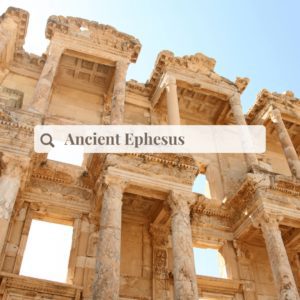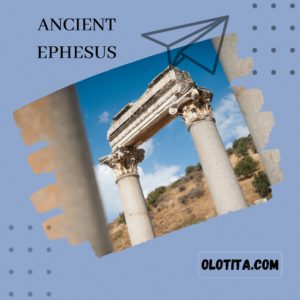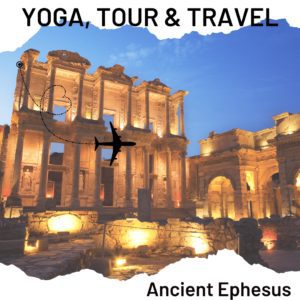
During the height of its power, the city of Ephesus was one of the biggest and most influential cities in the entire ancient Mediterranean world. According to myths and legends, Amazons, great female warriors, founded the city. Ephesus, or Ephesos is thought to have come from “Apasas” which means city of the Mother Goddess.
Located on the western coast of Asia Minor, in modern day Turkey, Ephesus was one of the oldest Greek settlements on the Aegean Sea. The city was inhabited from the end of the Bronze Age onward, but its physical location changed numerous times through history thanks to floods and the political agendas of various rulers over the city.

Sadly, little is known of the city’s origins. We know settlements dotted the coast of Asia Minor in the early Bronze Age and increased tremendously during Greek colonization. Along the way there were some settlements of non-Greeks and the city was ruled by different conquerors from the Persians to the Greeks. At that time it was deemed a free city, but it was subject to Roman control.
Ephesus is located at end of the Royal Road, which was the chief thoroughfare of the Roman East. Ephesus was imperative for East-West trade because it had one of the most important harbors for the exportation of goods to Italy, Greece and the rest of the Roman West.
The city later fell and was founded a second time by the Ionian, Androclus. Although the city was devastated during the 7th century BCE during the Cimmerian invasion, the Lydian kings ensured it rose again to become one of the wealthiest cities in all of the Mediterranean.
From a religious perspective, the city was created around the ancient shrine of the Roman earth goddess Diana (Greek Artemis). Later, during the Christian era, Ephesus became an important component of the expansion of Christianity. St Paul launched many of his missions from Ephesus.
And I appreciate the rights and privileges women enjoyed in Ephesus. Their rights were equal to that of men and there are a plethora of records of female teachers, artists, painters and sculptors, such as the artist Timarete (l.c. 5th century BCE), known for her painting of Artemis.

If you would like to learn more about this incredible ancient city, see these additional resources:
Details about some of the Excavations at Ephesus
Ephesus mentioned in the Bible
On Day 7 of the 2022 Retreat to Turkey, we will see experience Ancient Ephesus in person! This is one of the days I am very excited to share with you during our trip. I have been to Ephesus and I truly loved every second of exploration through this incredibly preserved ancient city. I know it will be a favorite for a lot of people who come on this trip because the entire site is so well preserved, you will literally feel like you are walking through history.

Even inside the garden houses in Ephesus, you can see well preserved mosaic floors and paint on the walls. It really takes you back in time in a very tangible way. Maybe you don’t know a whole about Ephesus, but you will get to see first hand what existed. I think day 7 will be a highlight day for you travel and history buffs alike.
The day doesn’t end in ancient Ephesus though! After an incredible lunch, we visit the house of Mother Mary, where it is thought she spent 4 years before her death. Pope Paul visited there in 1967. We will get to see in and around the house and a really beautiful prayer wall and fountains. After that we will drive to our hotel and stay the night in Kusadasi.
If you would like to walk through the history of Ancient Ephesus with us, tap here to learn more about the full Retreat and reserve your spot. And be sure to check out the full video on each day’s itinerary!




